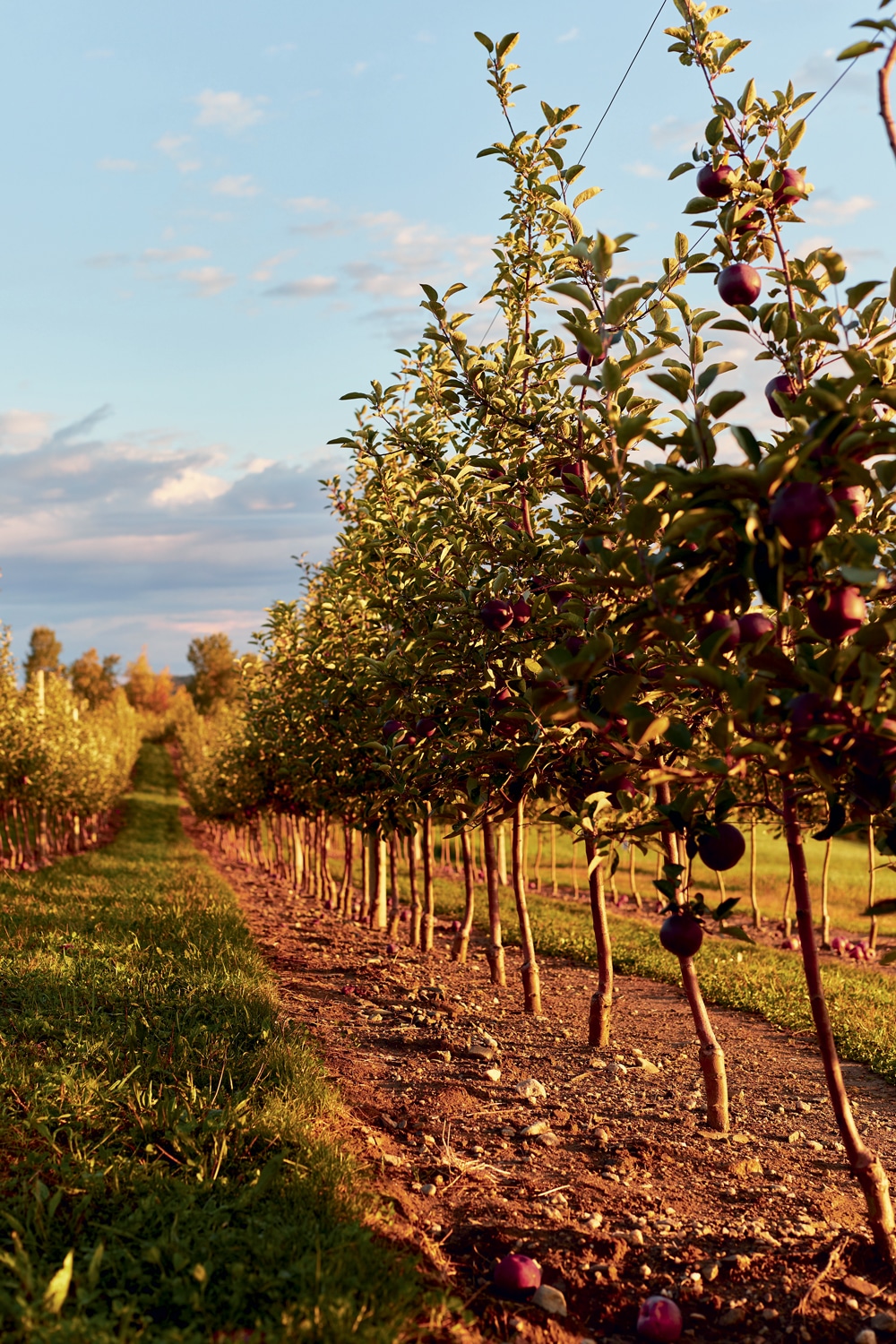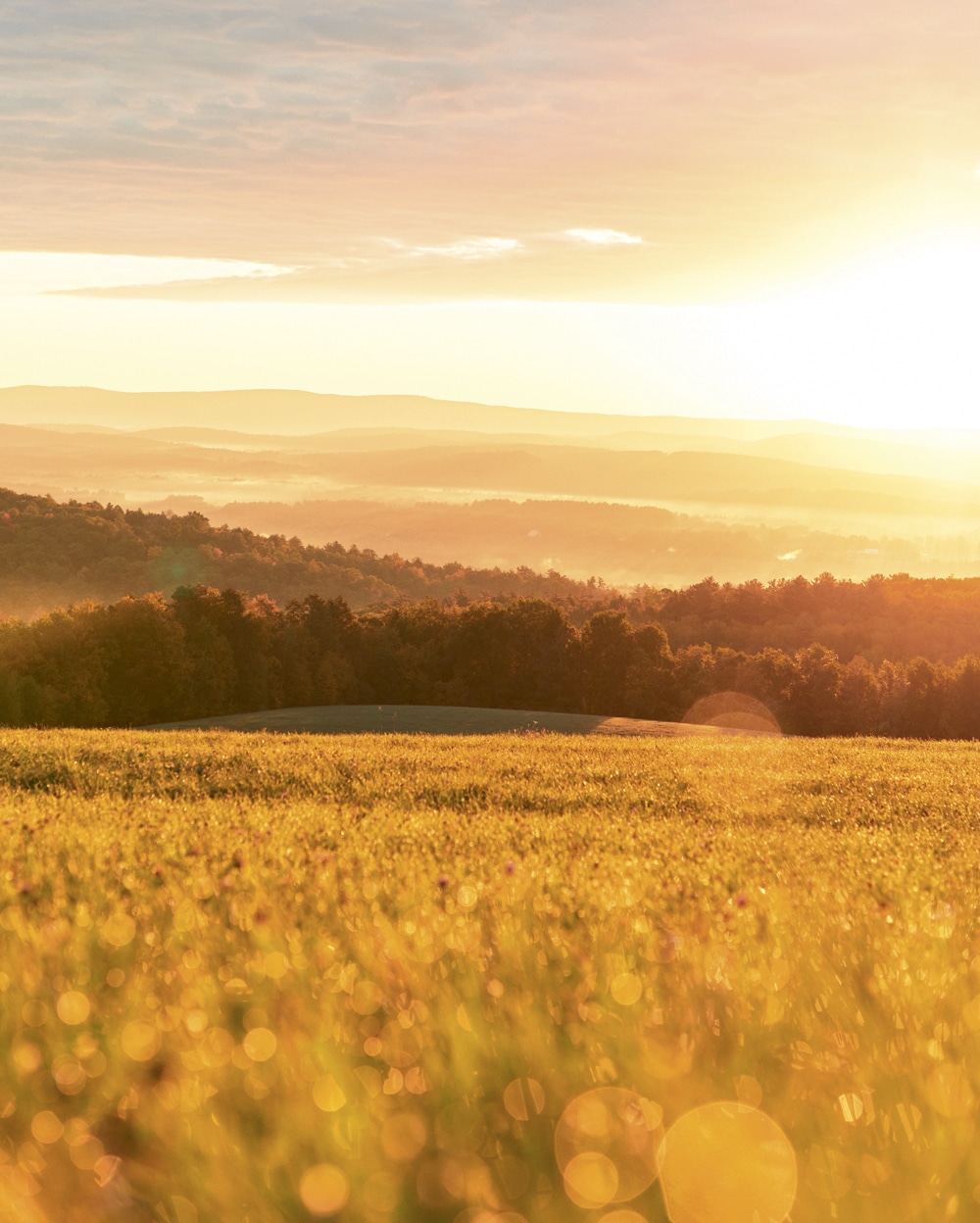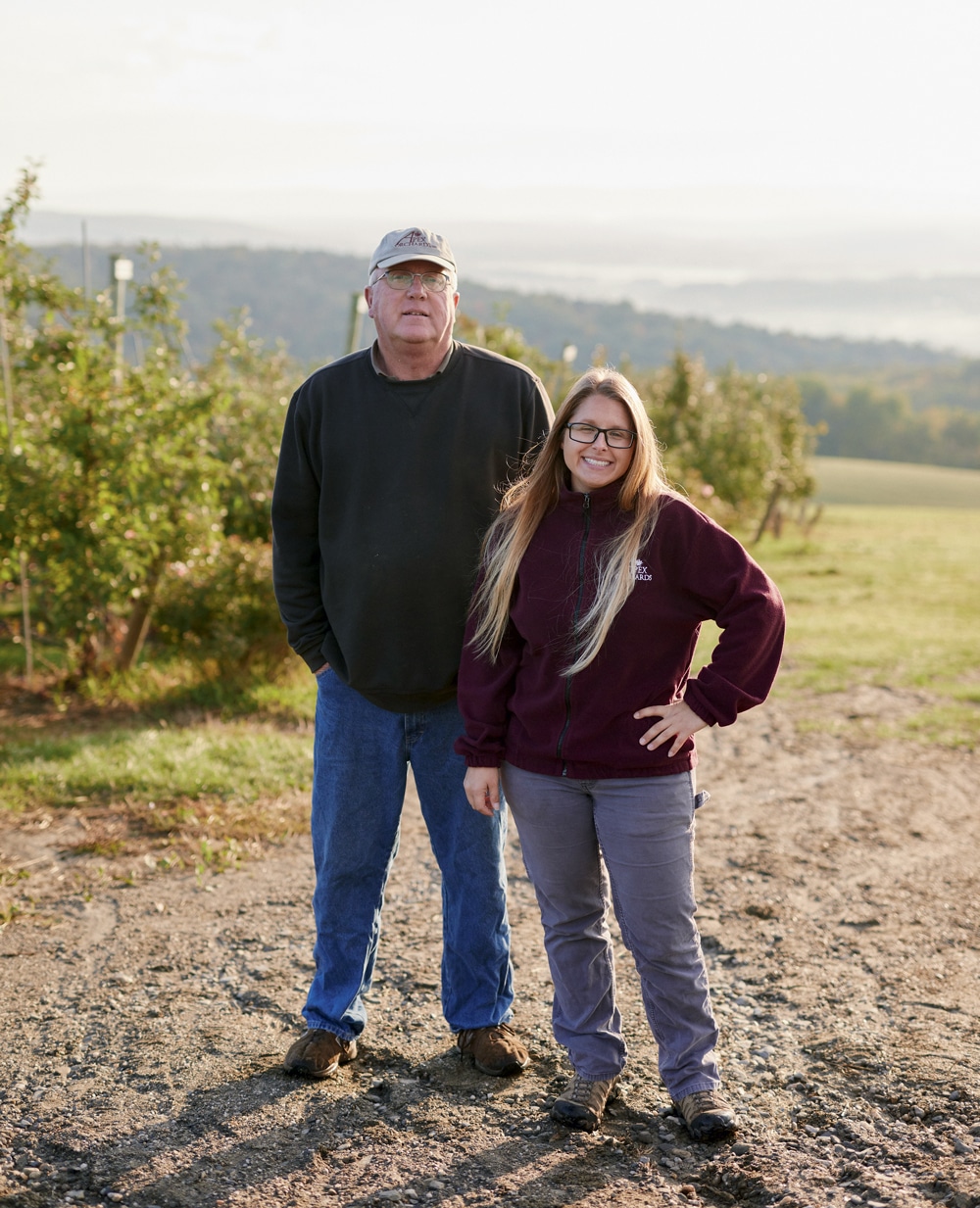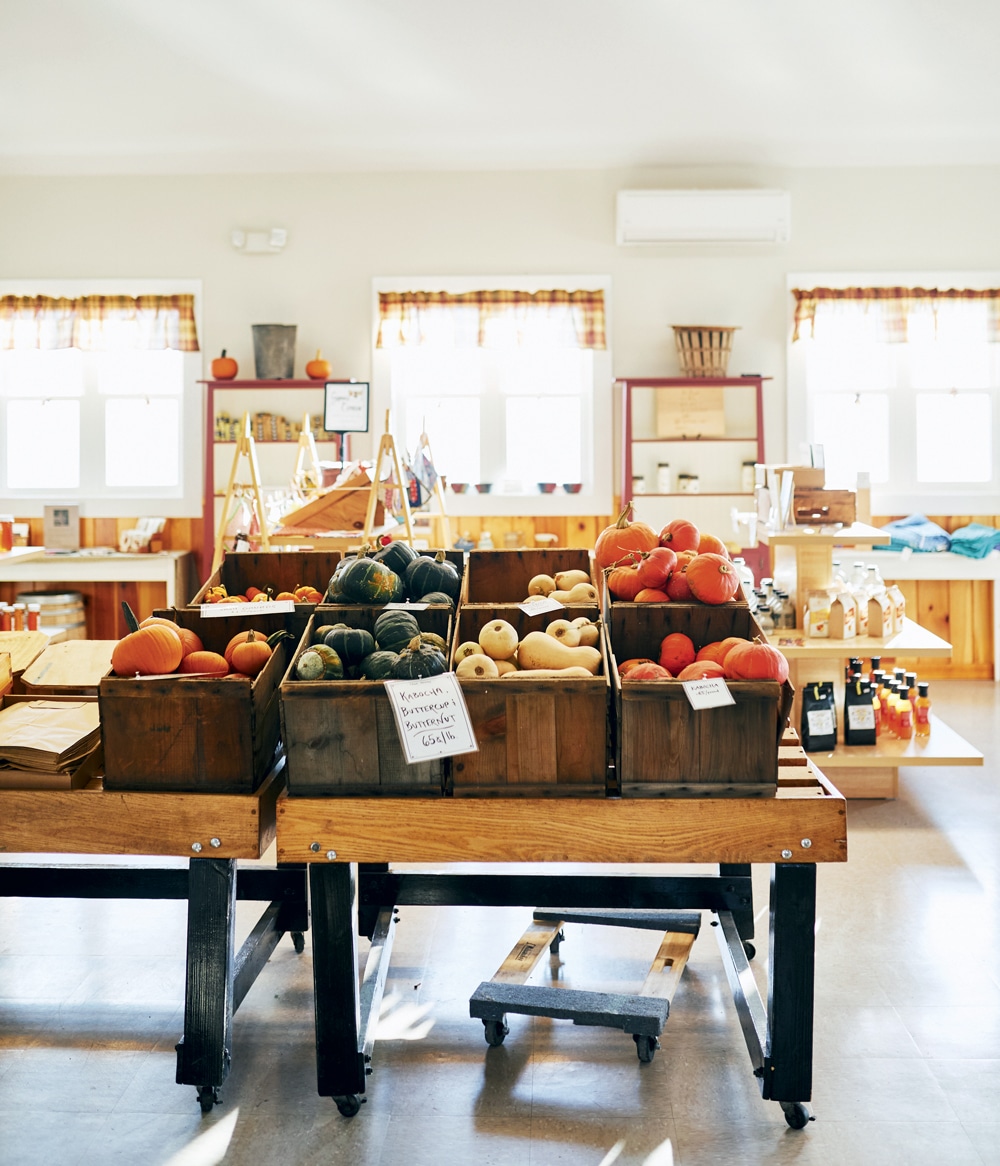Seeds of Change at Apex Orchards in Shelburne Falls, Massachusetts | First Light
Seeds of change are taking hold at Apex Orchards, a seventh-generation New England orchard in Shelburne Falls, Massachusetts.

The sprawling seventh-generation New England orchard.
Photo Credit : Megan HaleyCourtney Basil lifts a hand off the steering wheel and points forward. “I want to show you something,” she says over the rumble of her four-wheeler. It’s a Wednesday morning in early October, and Basil is leading me on a tour of Apex Orchards, the 380-acre fruit farm in Shelburne Falls, Massachusetts, that she co-manages with owner Tim Smith. She cuts across a large, sloping pasture with views that cut deep into Vermont and New Hampshire as we descend to “Three Corners,” a triangle-shaped plot with rows of Christmas trees of varying heights. We make a wide circle around the balsams before Basil turns around to head back to the larger pasture.

Photo Credit : Megan Haley
“Most people love the view from above, at the store, which is understandable,” she says. “You have this whole view of the property and everything behind it. But this, this is my favorite spot.”
The field before us holds its summertime greeniness, and at its crest sits the orchard’s farm store, giving it an unexpected grandness. On either side of the building the land spills down into acres of fruit trees. Over the next hour Basil will motor to other parts of the property—there are Cortlands and Macouns to check on, vines of grapes to sample, and the quinces need a set of eyes—but it’s down here in the valley where a kind of awe creeps into her voice about the land and its next chapter.

Photo Credit : Megan Haley
During its nearly 200-year life, Apex has only been in Tim Smith’s family. But at age 64 and with no heirs, he’s turning over ownership to Basil, 32, who lives on the farm with her fiancé. Though the transition will take a few years to complete, the arrangement will work like this: Smith will continue to live in the family farmhouse, draw a salary, and work part-time. Basil will inherit the land and business for free. Apex will continue on as a farm, and its new owner won’t be saddled with mounds of debt as she keeps it going.
“I don’t come from a family of farmers,” says Basil, who grew up in nearby Conway. “When I came here, it was because Tim had a job for me. But then this stunning thing hit me: I can do this for the rest of my life. It’s really something to work the land, to plant something, and then see that tree produce fruit. That’s satisfying. I knew Tim had been thinking about what would happen next for the farm and that he wanted to keep it a farm, and so I made my pitch.”
—
In 1828 a Revolutionary War veteran by the name of Abner Peck Sr. relocated from his family home in Lyme, Connecticut, to a soil-rich hillside property in western Massachusetts. On a plot of land with views of Vermont and New Hampshire, Peck built his farm. He raised livestock, grew vegetables, and planted the land’s first apple trees.
Over time the farm expanded, contracted, and expanded again. Shortly after World War II, Tim Smith’s grandfather, Lyndon Peck, closed the dairy operation his father had built up and converted the land to orchards. By the time Smith returned to the farm in the early 1980s, Apex was one of the largest wholesale apple suppliers in Massachusetts.
Over the next two decades, however, increasing expenses and regulations were never matched by an increase in profits. Smith turned to the burgeoning local-food movement and an expanded retail operation to keep the farm going. He sold his apples and honey out of a small store, opened a pick-your-own section of the orchard, and supplied local restaurants and farmers’ markets with his fruit.
But Smith always preferred to be planting trees or mowing fields instead of leading wagon rides or making sales calls. He grew up working alongside his father and grandfather, and to see the land with him is like opening his family photo album. Here are the first blueberry bushes his grandfather planted in the 1920s. Here is where Smith set up his first beehives as a kid. Here is the pond where Smith’s father once described to his young son how beavers built their dams.
All of which helps explain why Smith’s attachment to the orchard supersedes the dollars he could extract from it. Years ago conservation easements were placed on much of the property, cutting off any quick development money, and as he pushed closer to his own retirement Smith started considering options for his and the farm’s future. What he desired was both simple and complicated. He wanted to stay here, to work when he could, and to see his heritage remain a working farm. Smith had talked with another farmhand about taking over from him; when those conversations ended, Basil, who began working for Smith in 2010, approached her boss.
“In hindsight I should have gotten married and had kids,” says Smith. “But that didn’t work out, and even then you don’t know if the farm is going to be something your kids want to do. I want to continue to farm the rest of my life. As long as Courtney can put up with me, I’ll hop on a tractor and go mowing.”

Photo Credit : Megan Haley
The two are quite different. Where Smith is tall and quiet, Basil is short with an easy laugh—by her own admission, an extrovert. And though Smith can converse with farm visitors, Basil relishes it. Their working relationship is relaxed, full of light-hearted sarcasm. When Smith built the new store, he charged his partner with overseeing its operation. It was Basil who was the face of the orchard as Apex experienced a 40 percent bump in visitor traffic during the pandemic, and it was Basil who found new outlets for the orchard’s apples after Covid wiped out the 2020 farmers’ market season.

Photo Credit : Megan Haley
“We’ve been trying to walk that line between the [tourist experience] and wanting to keep it a farm,” says Smith. “It doesn’t really bother me that we’ve had to make these changes, but I’m not the person who should be out in front.”
Basil concedes that the stereotypical image of an orchard owner—older and male—exists for a reason. “It’s still a man’s world,” she says. But in a region at the core of New England’s biggest apple-producing state, Basil says she has felt welcomed by old-timers who see their industry begin to percolate with change. Two nearby orchards are also now headed by young women: Chelcie Martin at Honey Pot Hill Orchards in Stow, and Elly Vaughan at Phoenix Fruit Farm in Belchertown.
Which really shouldn’t be surprising. Successful farms always need to adapt; survival depends on it. Today, the big apple trees that Smith’s grandfather planted have been replaced by dwarf varieties that allow for easier care and greater production. Gone, too, are the days when Apex largely produced Macs. Some 50 different varieties are now grown at the orchard, as well as other fruit—nectarines, apricots, quinces, kiwifruit—that would have seemed unimaginable a few decades ago. Basil’s turn at the helm is just the latest iteration of a farm that is changing.
“It’s a relief to know that I don’t have to think about it,” says Smith. “It’s a farm and it’s going to stay a farm. It’s good to know that it will continue.”

Photo Credit : Megan Haley
It’s midmorning now, and he and Basil are standing around the store, which will open shortly. Earlier, Smith had remarked how quickly Basil had embraced the long days that come with the work. With some affection he’d called her an “old-fart farmer,” and I remind him of the comment.
Basil laughs. “That’s not true!” she exclaims, rolling her eyes. “Well, maybe it’s a little true—I can get a little stuck in my ways. This has all been a little unexpected. I never thought I could work on a tractor or help to open a store. It just shows you’re capable of anything if you really want to do it.” apexorchards.com
Ian Aldrich
Ian Aldrich is the Senior Features Editor at Yankee magazine, where he has worked for more for nearly two decades. As the magazine’s staff feature writer, he writes stories that delve deep into issues facing communities throughout New England. In 2019 he received gold in the reporting category at the annual City-Regional Magazine conference for his story on New England’s opioid crisis. Ian’s work has been recognized by both the Best American Sports and Best American Travel Writing anthologies. He lives with his family in Dublin, New Hampshire.
More by Ian Aldrich

